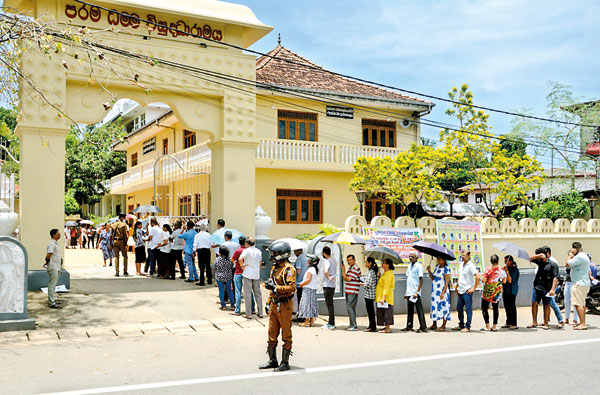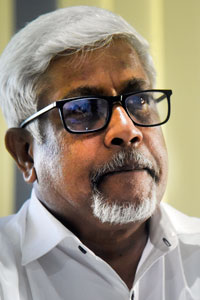News
Election Commission gets ready for another election
View(s):- Alternative venues to temple premises, usually used as voting centres, are being considered as Vas ceremonies are conducted in November, says the Commissioner General
By Ishu Bandara
The Election Commission has faced a snag in securing polling centers, particularly because of the Vas ceremonies taking place at Buddhist temples during the election month.
The General election is set for November 14, a day ahead of poya day.
Out of the 12,985 polling stations used in the previous presidential election, 2,165 were religious sites, including Buddhist temples. Some of these temples may be unavailable this time due to the ceremonial activities.

A temple premises turns voting centre at recently concluded election
“This has posed logistical issues, but the Election Commission is actively working on alternative solutions to ensure all polling centers are secured and ready for election day,” Commissioner General Saman Shri Ratnayake told the Sunday Times.
During the presidential election, they assigned 12,000 to 18,000 voters to each counting center, but for the General Election, they must reduce this number to around 10,000 to 12,000 voters. This is crucial because they need to focus more on counting candidate preferences, which also means increasing the number of counting centers, he said.
In response to the issue, alternative public venues have been arranged in the affected areas. “We’ve instructed our district deputy commissioners to work closely with Buddhist temples to identify those willing to offer their premises for the upcoming election,” the Commissioner General said.
“So far, we’ve received strong support from the temples, and we expect this cooperation to continue, as these venues are both familiar and accessible to the local communities.”

Saman Shri Ratnayake
He further explained, “If we are unable to secure a temple itself, we’re exploring the option of constructing temporary shelters either within the temple grounds or just outside, with the agreement of the temple priests.”
Meanwhile the Commissioner General has refuted recent claims by international observers regarding low female participation in the electoral process. He expressed surprise at the observers’ statement, stressing that a substantial number of women have consistently been active in past elections and will continue to be involved in the upcoming General Elections.
According to him, women’s engagement in Sri Lanka’s electoral system has always been significant, and he questioned the basis of the observers’ concerns. He said that female participation remains robust and is a vital part of the country’s democratic process.
“In response to certain European observers, it’s important to note that our infrastructure cannot be directly compared to theirs, as we face significant financial limitations. We are making the most of the available facilities within the country for election centers, utilizing everything we are permitted to access.
“However, allocating additional funds to improve these centers specifically for election purposes is not feasible, as it would place an unsustainable burden on
our budget.”
During the last election, one of the claims against the commission was ensuring the privacy of voters while they marked their ballots. Addressing this, the Elections Commissioner General clarified that officials are not there to monitor who voters are choosing, but rather to ensure the integrity of the voting process.
“We have provided specific training to our Senior Presiding Officers to remain vigilant, not regarding the voter’s choice, but in detecting any violations or irregularities during the voting process. The focus is on maintaining a secure and fair environment for all voters.”
Addressing the concerns raised by foreign observers regarding inadequate facilities for disabled and elderly voters during the Presidential Elections, the Sunday Times inquired about the measures being taken to rectify this at the upcoming elections.
Mr. Ratnayake said, “We currently don’t have a comprehensive database of the disabled community, and it would be unethical to gather such information during voter registration. This makes it challenging to provide targeted support, but we’ve done our best with the resources available. I acknowledge that there are gaps, especially for the disabled and elderly communities.”
He highlighted the shortage of sign language interpreters, noting that Sri Lanka has only 26 interpreters, which is insufficient to meet the demand across all polling stations. “This is an area that requires development through the Ministry of Education and the Social Services Department. In collaboration with other organizations, we’ve created a sign language lexicon with 325 words in both Tamil and Sinhala and have trained some of our staff as sign language trainers.
However, it’s still not enough to cover all 12,985 polling centers,” Mr. Rathnayaka told the Sunday Times.
He also emphasised the need for legislative action. “We have proposed the introduction of advance voting and a special voting system to address these issues. Unfortunately, the legislation has not yet been passed.”
“The campaign finance limit must be officially gazetted by November 16, following the close of nominations on November 11, as it is required to be finalized within five days. After all candidates submit their reports by November 13, the limit will be set. The decision on the campaign finance cap was reached after discussions with party secretaries and independent group leaders, incorporating their proposals into the final decision. The limit will be divided into two categories: one for political parties and the other specifically for individual candidates,” Mr. Rathnayaka further added.
“The General Election poses a much greater challenge compared to the Presidential Election, as it’s essentially like conducting 22 separate elections. We need to print and proofread 22 different ballot papers, significantly increasing our workload. Every stage of the process requires us to work at 22 times the speed, and this means we need more manpower and improved infrastructure, particularly in the counting halls,” he said.
All this additional manpower comes from government sectors, with employees bound by legal obligations. If any corruption occurs during the election process, these individuals may face disciplinary action, which could ultimately impact their pensions. For non-technical tasks, they have also enlisted help from the private sector to ensure the election runs smoothly.
Mr. Rathnayaka stressed the importance of not publishing the method of marking preferences in the media, as doing so could potentially confuse voters. He noted that Sri Lankan voters have been familiar with the preference marking system for years, and any unnecessary publicity around it might create misunderstanding rather than clarity.
In addition, Mr. Rathnayaka mentioned that the Election Commission plans to engage in discussions with media outlets about the allocation of airtime for each candidate in the future. “It’s crucial to ensure that all candidates receive fair and balanced coverage,” he said, emphasizing the Commission’s role in maintaining an equitable media presence during the campaign period. These discussions are part of the broader effort to ensure transparency and fairness throughout the electoral process.
The best way to say that you found the home of your dreams is by finding it on Hitad.lk. We have listings for apartments for sale or rent in Sri Lanka, no matter what locale you're looking for! Whether you live in Colombo, Galle, Kandy, Matara, Jaffna and more - we've got them all!

